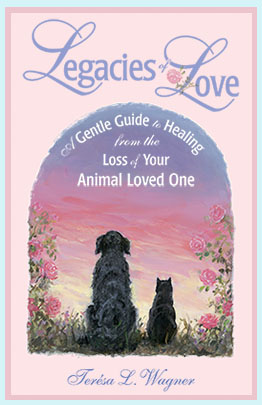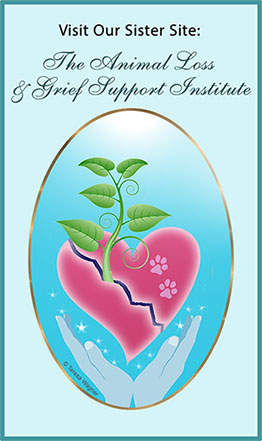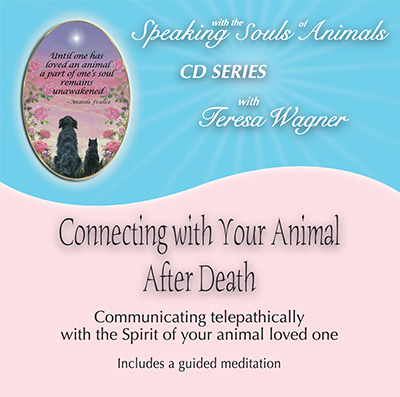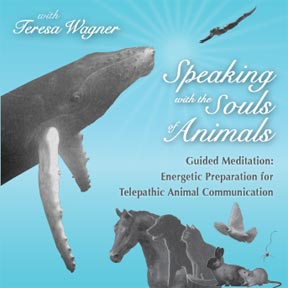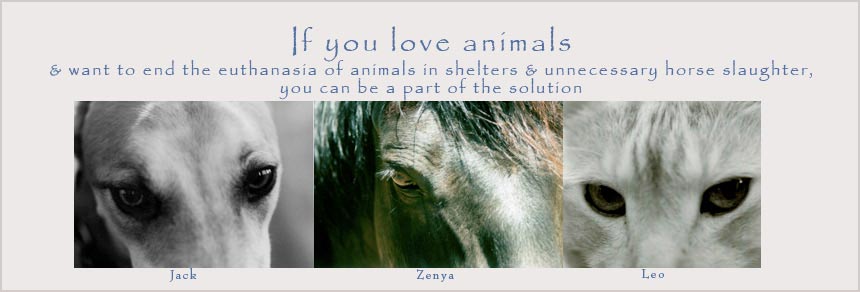Pet Loss Grief Support
Why We Get Stuck in Grief
Why is it that we don't always easily move through the healing of grief? What does this mean and why does it happen? Many experts call this complicated grief or being stuck in our grief, feeling we just can't move on. The symptoms and consequences of complicated grief can be far reaching and sometimes destructive. So it's important to look at our grief, and examine whether or not there might be some issues in need of attention and help.
Here are three different ways in which our grief may become complicated:
-
One is that we may be completely stuck in denial. This is the case when we have experienced the loss of an animal we deeply, deeply love and yet act as if nothing of significance has occurred or changed in our lives. This does not refer to times when we may appear composed around others but in private feel our feelings and cry our tears. It is when we pretend, even to ourselves, that there are no feelings of pain, that there are no tears to shed. Or when we feel the tears inside but they just can't come out. Denial is an understandable though usually unconscious choice we make to bypass our pain. The sad consequence of denial, however, is that real emotional pain such as grief cannot be sidetracked forever. It comes back, or it expresses itself in distorted unhealthy ways ~ in our emotional or physical lives. Loss is part of life and facing and healing our grief is part of becoming a whole person. And for those of us who love animals, part of our responsibility to them is to bring our best, healed, whole self to the inevitable next relationship we will have with another animal or animals. If you feel you may be stuck in denial regarding the loss of your pet, you may want to explore the following resources of support:
-
Flower Essences: Dandelion, Golden Ear Drops, Yerba Santa; available from www.floweressence.com Also, see our section on Flower Essences to Help Us Cope & Heal From Grief
-
Meditation Tapes: Letting Go of a Relationship: Changing the Form; available from www.orindaben.com (scroll down to this title)
-
Reach out and talk with others who understand your pain. Visit our Pet Loss Support Resource section to find other pet loss web sites which have pet loss message boards and chat rooms, and to find a grief counselor or support group in your area.
-
-
A second way we might recognize complicated grief is when we feel we are just unable to cope. This could take any number of forms. It might show up as having trouble just functioning day to day ~ going to work, taking care of ourselves and any family members, meeting obligations ~ beyond our initial acute period of grief. It may mean we're having great difficulty tolerating the strong feelings of anguish and sorrow, and perhaps even feeling scared that these overwhelming feelings will never go away. It may mean that we simply can't let go of feelings of anger or guilt, and we walk through our days being eaten up by unresolved rage or remorse. And sometimes, when we feel unable to cope we may turn to excessive use of substances such as alcohol, food or drugs, creating a dependency and yet another problem. Complicated grief might also take the form of simply not being able to face life without our beloved animal by our side. We may believe that life can never be the same again, normal, or even bearable. We may feel incapable of ever finding meaning and satisfaction in life again, becoming depressed or even suicidal. When we feel this lost, this unable to cope, it is absolutely critical to get help. It saddens me when I work with clients who feel this way, loving people who so obviously love their animals, and would not for a moment hesitate to seek medical attention for their animals, yet so often hesitate to seek professional help for themselves. It does not serve us or our beloved animal companions to love and care for them and not ourselves. We deserve to be our best selves, and our animals deserve to have us bring our best, full selves to our relationships. If you are having serious trouble coping you deserve help and help is available. See our Pet Loss Support Resources section to familiarize yourself with the wide range of support available.
-
A third reason so many of us can get "stuck" in the grief of losing our beloved animals is this:
We are the most hopeless and despairing from loss when we have not yet learned how to give to ourselves or provide for ourselves what it is we received from another who is now gone.
Let me say that again:
When we have not yet learned how to give to ourselves what it is we received from another who is now gone.
This can be true of any loss in life: The parent whose last child leaves home and has now also lost what may have been their primary purpose in life; the career person who loses their job and has now also lost their sense of identity; and, of course, the person who has lost their beloved animal companion and has now also lost a major source, if not the only source, of unconditional love in their life. The obvious part of loss is the heartbreak. The not so obvious is that there is also available to us a gift ~ a great opportunity of growth. To find this gift we can first learn what it is our animal gave us that we don't yet give to ourselves, and then go about finding ways to somehow, some way learn to provide this for ourselves. Not in an attempt to live entirely independently, not to live alone on an island. But to become more whole, more interdependent versus dependent on the animals we love, for the sake of our own growth and for the sake of our relationships.
My first conscious experience with this issue was when my cat Muffin died in 1985. He was the first animal I'd lost as an adult, and though I expected grief, I was stunned by my emotional devastation. I was able to continue to work, but beyond that I was simply crippled. Luckily, I found a wonderful therapist who not only loved animals but who knew something of grief also. In a session I'll never forget, because it changed my life, she asked me a series of questions as I cried about Muffin. The questions seemed silly and the answers obvious until the end...
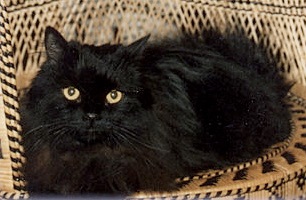 Muffin Wagner, 1975-1985
Muffin Wagner, 1975-1985She first asked, "Where do you think Muffin is?" "In heaven, with God", I said.
"Do you think God loves Muffin and is taking care of him?", she asked. "Yes, of course I believe God loves Muffin."
"Do you believe Muffin loves you?" "Of course, he loves me deeply and unconditionally, more than anyone I've ever known."
"Do you love Muffin?" "Of course, I love him more than anything in the world."
"Do you love yourself?" "What? I'm sorry, what?", I asked her, taken off guard.
"Do you love yourself, the way you love Muffin and the way he loves you?"
I was just stunned. Silent. Then I cried at the realization that I did not in fact even begin to love myself. Respect myself in certain roles and for certain accomplishments, perhaps. But love myself? And as much and as fully as Muffin did? Hardly. My God, no, I did not love myself.
I began to see from that gentle confrontation how out of balance my loving was. And how I would never, ever reconcile my grief of losing this precious cat child of mine as long as I pined for what he had given me, without even trying to learn to give it to myself ~ to learn to love myself. 1985 was a long time ago. In the years since I have begun this journey of learning to love myself and have found that it is sometimes joyful, sometimes arduous, but always rewarding. So Muffin's gift to me was not only his profound unconditional love given during his lifetime, but the idea that I need not be without such love after his death. This gift ~ learning to love myself ~ has altered my life in many ways. It has made me less needy in my relationships with people and with my other beloved animals. Not that I don't still have the need to be loved, of course I do. But when we love someone deeply, animal or human, and need and accept their love, without loving ourselves, we create a state of imbalance, a relationship where we are expecting too much of that other being to meet our needs.
When we don't love ourselves and are dependent only on external sources for love, we set ourselves up for horrible suffering at the time of separation. This is true of all of our relationships, human and animal. Don't let anyone ever convince you that you are stuck in your grief "because you love animals too much." There is really no such thing as loving anyone, of any species, too much. What we can do, though, is love another more than ourselves. When we learn to love ourselves more fully, we'll still experience the inevitable pain of grief when we lose a loved one, but the suffering transforms to a quiet grace.
If you feel you may be stuck in your grieving because you believe you'll never feel love again the way you did with your animal loved one, explore some of these sources of support:
Flower Essences for building self love and unconditional love:
Mariposa Lily, available from www.floweressence.comInmortal, available from www.desert-alchemy.com
All of us have our own unique journey of learning to cope and heal from profound loss. And each loss we have will bring a different journey. I wish you many, many blessings of love and support as you journey through your grief. For more ideas on support for yourself, you may want to look through our Pet Loss Support Resources section, read Twelve Ideas on Coping an Finding Comfort, or listen to the Legacies of Love audiobook.
You may want to consider taking Teresa's pet loss teleclass for further support:
Legacies of Love, Gentle Healing from the Loss of Your Animal Loved One
If you have interest in helping others with grief, visit our sister web site:
The Animal Loss & Grief Support Institute

